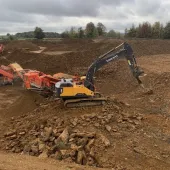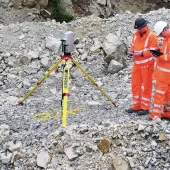RTPI/MPA Mineral Planning Conference

2019 conference considers how can planners help ensure a reliable supply of minerals
MORE than 150 attendees from over 70 different organizations, including the minerals industry, national agencies, local government, NGOs and specialist consultancies, attended the annual joint Royal Town Planning Institute (RTPI) / Mineral Products Association (MPA) Mineral Planning Conference in Manchester on 16 May.
As city regions across the country develop ambitious growth strategies, a reliable and secure supply of minerals is more important than ever. The annual conference brought together all the key stakeholders to explore how effective minerals planning underpins local and regional aspirations for housing, jobs and infrastructure.
Opening remarks were given by RTPI chief executive Victoria Hills, but commenting before the event she said: ‘We’re delighted to be organizing the Minerals Planning Conference this year in partnership with the MPA. The minerals industry generates £235 billion every year in value added to the UK economy – it underpins much of our national economic activity and is a vital part of a broader industrial strategy. We need to ensure that minerals planning is well resourced in local planning departments to make the most of this potential.’
The MPA’s chief executive, Nigel Jackson, provided the keynote address, describing some of the opportunities and challenges for minerals planning in the current ‘Climate of Change’, including the need for parliamentarians and policymakers to work with the industry on biodiversity and concerns about localism.
Experts Dai Larner, executive director - regeneration, High Peak Borough Council / Staffordshire Moorlands District Council; Rob Murfin, director, Northumberland County Council; Paul Haggin, development control and countryside management, Cumbria County Council; and Chris France, director of planning, North York Moors National Park addressed a range of strategic mineral-planning issues around demands for housing, infrastructure and regional growth.
A legal update was given by barristers Nina Pindham and Hugh Richards of No5 Chambers, who discussed recent decisions with reference to the green belt and landscape.
David Young, business development manager - freight at Network Rail, spoke about minerals, freight and logistics, and Simon Emery from Highways England discussed the role of the roads network in supporting the efficient and sustainable movement of minerals.
David Lowe, team leader - ecology, historic environment and landscape at Warwickshire County Council, was joined by Victoria Fletcher from Oxford County Council and considered mineral extraction and the 25-year Environment Plan, covering proposals for biodiversity net gain, environment net gain and natural capital.
Commenting, MPA chief executive Nigel Jackson said: ‘Mineral products make an important contribution to the UK economy and underpin almost every aspect of our way of life, from our homes, schools and hospitals to the transport and energy infrastructure we take for granted. But the ongoing supply of these essential minerals cannot be assumed. They need to be planned, monitored and managed to ensure that the right materials are made available in the right place and at the right time to ensure a sustainable, cost-effective supply is maintained to meet the nation’s needs.
‘This conference highlights the importance of and continuing need and for effective, well-resourced minerals planning at both strategic and local scales to ensure a steady and adequate supply of these essential construction materials can be maintained.’









